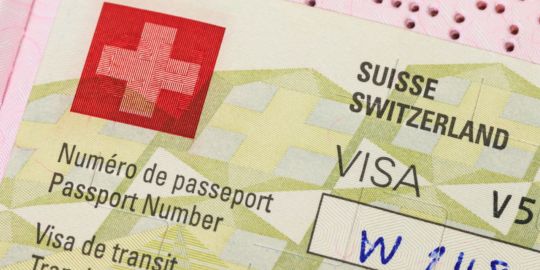Applying for a work permit for Switzerland

If you wish to work in Switzerland, you will need a work or “residence” permit. The admission process varies depending on your nationality, but as a general rule, EU/EFTA nationals can benefit from agreements on the free movement of persons (although quotas still apply for certain EU nationalities). If you're coming from a third country, you should know that due to federal quotas that are placed to encourage companies to hire locally first, only a limited number of specialists, management level and other qualified employees are admitted. In certain fields, including medical, catering and education, you will have to take part in a supplementary examination, i.e. follow three additional years of studies (at your own expenses).
If you're an EU/EFTA national
In general, nationals of the European Union and of the European Free Trade Association (EFTA) are allowed to stay in Switzerland for 3 months without an employment contract, in accordance with a free movement agreement which came into force in 2002. This agreement allows you to travel to Switzerland to look for a job or to perform an independent activity, although conditions do apply (see below for quota considerations). For longer stays, you will need a residence permit ' the type of which depends on your particular case.
Quota considerations for EU/EFTA nationals
In the past decade, immigration to Switzerland exceeded expectations, so 'quotas' were introduced to limit the number of people who could immigrate from specific countries. According to this quota system, Europe was divided into zones: people from certain zones, like Eastern Europe, would not be allowed entrance past a number of people each year (quota). This practice contradicts the free movement agreement so there have been a lot of negotiations, referendums and discussions about it. Currently the 'quota' system has officially ended for all countries, however, there is a 'safeguard clause' that applies to citizens from Bulgaria and Romania: in case immigration from these countries exceeds a certain threshold, quotas will be applied again until 2019. Croatia was the last country that had its quota lifted last year but are still some restrictions regarding access to the labour market. For UK nationals, it is still unclear how Brexit will affect their ability to work in Switzerland and whether they will be subject to quotas once all Brexit negotiations are carried out.
EU/EFTA permit types: Short Term (L)
The L EU/ EFTA permit is a short-term permit which is generally valid for 3 to 12 months, depending on the validity of your employment contract. It applies to EU/EFTA nationals whose employment contracts have a duration of less than a year. This type of permit allows you to change your place of residence, as well as your employer. You can also receive this permit after your 3-month stay in Switzerland even if you haven't found a job yet ' but you need to register with the communal authorities before starting your job search, within 14 days following your arrival. If your contract is less than 3 months, you don't need a permit to work in Switzerland: simply report to the communal authorities upon your arrival.
EU/EFTA permit types: Initial Residence (B)
The B EU/ EFTA permit is a stay permit that allows you to live in Switzerland for up to 5 years, provided you have an unlimited employment contract. At the end of 5 years, the permit is renewable for a similar period, provided that your employment contract hasn't changed. If you remain unemployed for more than a year, the renewal of your residence permit may be limited to a year only. In general, unemployed and self-employed EU/EFTA nationals are also eligible for a B permit in Switzerland provided they have sufficient funds to support themselves and the means to prove it.
EU/EFTA permit types: Permanent Residence (C)
This permit type has unlimited duration. It allows nationals of EU/ EFTA member countries to settle in Switzerland after having spent more than 5 years without interruption in the country ' provided that no restrictions on settlement in Switzerland are in effect at the time.
EU/EFTA permit types: Cross-Border Commuter (G)
This type is intended for people who live in a border zone and work in another border zone in Switzerland, provided they go back home at least once a week. However, this permit is no longer necessary for most EU/EFTA nationals.
If you're a third-country national
Terms and conditions regarding the work permits for nationals of non-EU countries are more restrictive. Having obtained an employment contract is the first step, and something you must do before even entering Switzerland (see below in Procedures), but even that does not guarantee obtaining a work permit. Your eligibility for that depends on the qualifications and skills you have that are required and are not available locally or within the EU/EFTA region. Note that the number of available permits is very limited.
Good to know:
You have more chances of obtaining a work permit if you are a specialist and/or highly qualified, with university qualifications supported by successful professional experience. You may also be required to be fluent in German, French, or Italian.
Third-country permit types: Short-term residence (L)
The L permit is a short-term permit allowing a non-EU to work in Switzerland for less than a year. However, its validity varies according to that of the employment contract and can reach up to 24 months provided you do not change your employer during this period. Note that the L permit also applies to those wishing to perform an internship in Switzerland as part of their vocational or continuous training.
Third-country permit types: Initial residence (B)
The B permit allows non-EU/EFTA nationals one year stay in Switzerland and can be renewed each year if there are no conflicts (legal or social). It is issued in the canton where you have settled and does not allow you to change your canton of residence or workplace. Moreover, income tax for holders of the B permit is deducted at source. This type of permit is limited and subject to the quotas that may be in effect at the time.
Third-country permit types: Permanent residence (C)
After you have stayed for 10 uninterrupted years in Switzerland (or 5, if you're an American or Canadian citizen), you are eligible for a C permit. Once you have obtained your resident permit, you are free to change employer and even your place of residence. Moreover, income tax will not be deducted at source. Note that the C permit is subject to the federal confederation's approval although it is issued by cantonal authorities.
Procedures
If you've attained an employment contract to work in Switzerland as a non-EU/EFTA national, your new employer needs to handle your visa arrangements for you to enter the country. Then, you will have to send your passport to the Swiss embassy or consulate in your home country, so that they can issue your visa. Upon arrival, you must notify the communal authorities about your place of residence, so that they can forward your papers to the appropriate cantonal authorities. It's actually the cantonal authorities that will issue your residence permit. For your registration, you'll need the following:
- your valid passport
- your ID card
- birth certificate (and marriage certificate if applicable)
- passport-size identity photos
- your employment contract
- proof of health insurance
Other documents may also be requested, so it's best to inquire with the communal authorities first. The whole process can take from three weeks up to several months, so it's very important that all your documentation is in order.
Good to know:
Once you have obtained your permit, your family members, namely your spouse and children (less than 21 years old) or other dependents, can also settle with you in Switzerland.
Useful links:
Swiss Info: Work Permits
Information on Free Movement of Persons
Immigration quota for Bulgaria & Romania
Switzerland Official Portal









